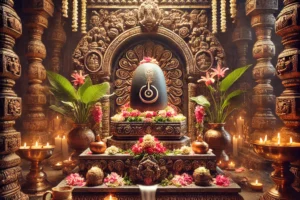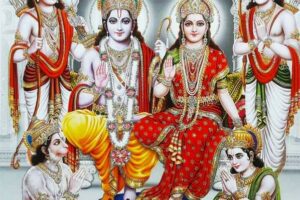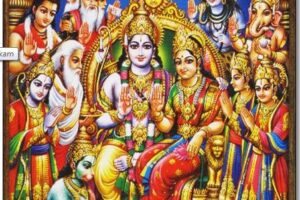
Mahalaya Pakshamu-English
- Posted by Dr. Srinivas Jammalamadaka
- Date March 9, 2023
- Comments 0 comment
Introduction
The second fortnight (kṛṣṇapakṣa) of the lunar month of Bhādrapada is called Mahālayapakṣa/Pitṛpakṣa. The fifteen days of Mahālayapakṣa are auspicious to perform Śṛāddha (ancestor worship).
The word Mahālaya is a compound of two words ‘Maha’ and ‘ālaya’. The word maha in this context means celebration or utsava. Ālaya means place. In the present context, ālaya would mean time. So, the word Mahālaya means the time of celebration.
Who is celebrated?
The ancestors are celebrated. Therefore, the fifteen days in which the ancestors are celebrated is Mahālayapakṣa. As Pitṛs are celebrated, it is also called as Pitṛpakṣa.
Normally, Pitṛśṛāddha is performed annually on the tithi in which the ancestor left the body. Apart from that, Pitṛśṛāddha is performed on the Mahālayapakṣa. The difference and significance of Mahālayaśrāddha is that unlike in the annual Pitṛśṛāddha, the pinḍapradana is not only done for paternal and maternal father/mother, grandfather/mother, and great-grandfather/mother but for friends, family, gurus and etc.
Why is the second fortnight (kṛṣṇapakṣa) of the lunar month of Bhādrapada is considered as Mahālaya?
In the dharma śāstra text, parāśaramādhavīya, we find this citation –
nabhasya kṛṣṇapakṣapratipatprabhṛti paṃcadaśadināni kṛtsnaḥ|
aparapakṣaḥ savitari kanyāgate sati mahālaya iti proktaḥ||
This means – in the second fortnight of the lunar month of Bhādrapada, when the sun enters the constellation of kanyā (Virgo), the fortnight is called mahālaya.
In addition to this, the bṛhanmanusmṛti states –
āṣāḍhīmavadhiṃ kṛtvā paṃcamaṃ pakṣamāśritāḥ|
kāṃkṣaṃti pitaraḥ kliṣṭā annamapyanvahaṃ jalam||
This means – that starting from the full moon day of the lunar month Āṣādha, the fifth fortnight is considered auspicious for śṛāddha and the Pitṛdevatas desire annam and jalam.
And in bhaviṣyapurāṇa, we find this –
kanyāṃ gate savitari pitṛrājño-nuśāsanāt|
tāvat pretapurī śūnyā yāvadvṛścikadarśanam||
tato vṛścikamāyāte nirāśāḥ pitaro nṛpa|
punaḥ svabhavanaṃ yānti śāpaṃ dattvā sudāruṇam||
This means – that when the sun enters the constellation of kanyā (Virgo) until it enters the constellation of vṛśchika (Scorpio), the Pitṛdevatas descend from the Pitṛloka to bhūloka by order of Yama (who happens to be the king of Pitṛloka). As the Pitṛdevatas are in bhūloka, it is the duty of the descendants to offer śṛāddha.
Then there can be a question – if Pitṛdevatas are in bhūloka from the sun enters the constellation of kanyā (Virgo) until it enters the constellation of vṛśchika (Scorpio), why only the second fortnight (kṛṣṇapakṣa) of the lunar month of Bhādrapada is called Mahālayapakṣa/Pitṛpakṣa, and the śṛāddha is performed in this fortnight?
ākāṃkṣaṃti sma pitaraḥ paṃcamaṃ pakṣamāśritāḥ|
tasmāttatraiva dātavyaṃ dattamanyatra niṣphalam||
This means – that the Pitṛdevatas desire śṛāddha to be performed on the second fortnight (kṛṣṇapakṣa) of the lunar month of Bhādrapada, and hence, the śṛāddha performed on other than the Mahālayapakṣa is unfruitful. Therefore, it is understood that Mahālayapakṣa is the right time to perform Mahālayaśṛāddha.
Relation of Mahālayapakṣa and bustling of crackers on Narakachaturdaśī
The Pitṛdevatas who descended to bhūloka, return to their loka on Narakachaturdaśī. And hence, Ulkādānam is done. Ulkā means an object which emits light. In the present context it means sparklers, crackers etc. That means one should give sparklers, and crackers to others.
What is the purpose of ulkā dānam?
The second half or kṛṣna pakṣa of bhādrapada lunar month is called as mahālaya pakṣa or pitṛ pakṣa. At this time our ancestors visit us in bhūloka to bless us. That is why ṣrāddhas are performed in these fifteen days. These pitṛ devatas return to pitṛ loka starting from naraka chaturdaśī. Hence, by igniting light through crackers, sparklers etc. in the night, it is believed to help them in their return journey. That is why while performing ulkā dānam the below śloka is to be uttered –
अग्निदग्धाश्च ये जीवाः येऽप्यदग्धाः कुले मम॥
उज्ज्वलज्ज्योतिषा दग्धाः ते यांतु परमां गतिम्।
यमलोकं परित्यज्य आगता ये महालये॥
उज्ज्वलज्ज्योतिषा वर्त्म प्रपश्यंतु व्रजंतु ते॥
(our ancestors who had proper cremation and who did not have proper cremation in my family, may they all have a good afterlife. Those ancestors who have come at mahalaya pakṣa, may they be able to see their way properly in their return journey (while we light the crackers)). On this day, in the evening, lamps have to be lit, and the sky is to be lit by crackers, sparklers, etc.
In this way, Mahālayapakṣa/Pitṛpakṣa is an auspicious time and an occasion to remember and celebrate our ancestors.
You may also like

శివుడితో ముచ్చట్లు – శివుడిచ్చేది కావాలా,శివుడే కావాలా?

SriRamaNavami Vratakalpamu – Sanskrit

